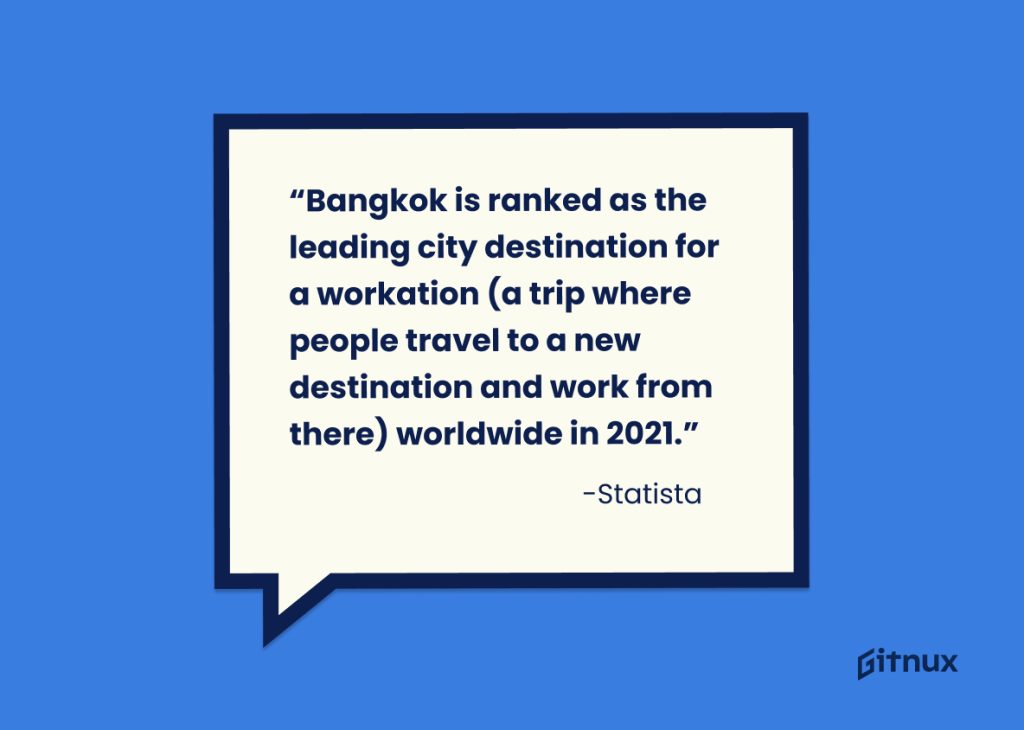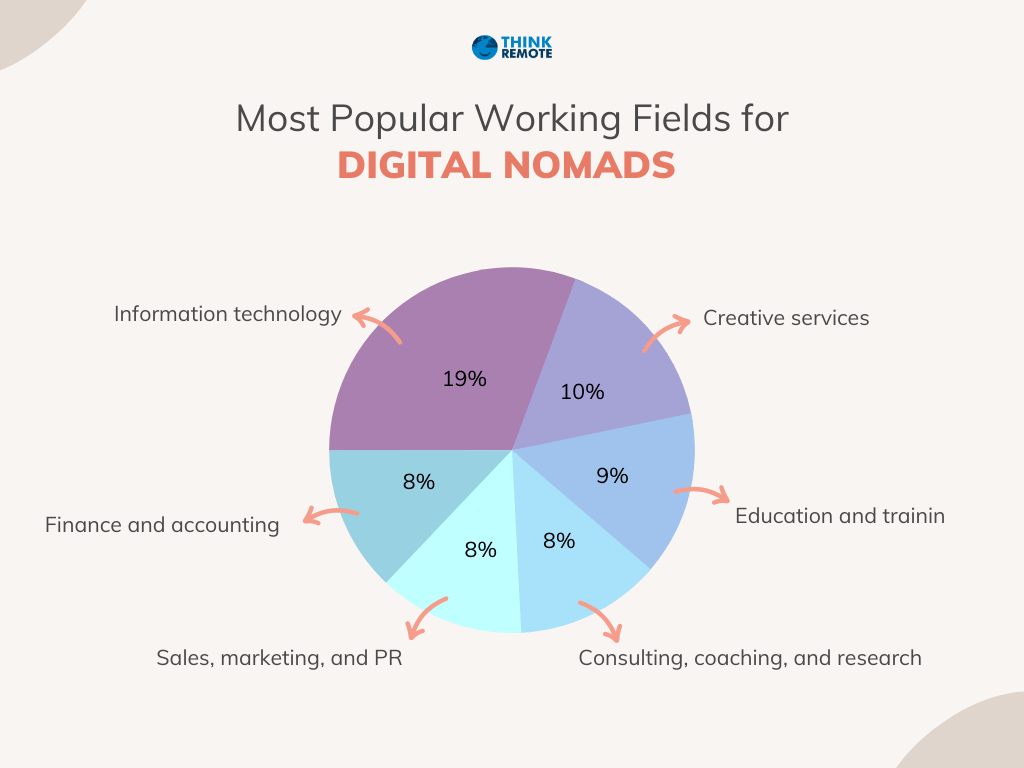In recent years, the concept of digital nomadism has gained tremendous popularity as more and more people seek the freedom to work remotely and travel the world.
The allure of being able to work from a beach in Bali or a cafe in Paris has sparked the imaginations of many, but the reality of the lifestyle is not all sunshine and rainbows.
While the digital nomad lifestyle certainly has its perks, it also comes with its challenges, such as loneliness, unstable income, and the need to balance work and travel.
In this guide, we aim to provide an overview of the pros and cons of becoming a digital nomad, as well as practical tips on how to make it work for you.
The pandemic has caused a significant increase in the number of traditional jobholders becoming digital nomads, with over 50% of the world’s digital nomads in 2022 being from the US. The number of American workers describing themselves as digital nomads has surged by 131% from pre-pandemic levels in 2019, reaching a total of 16.9 million.
Whether you’re a freelancer, entrepreneur, or simply someone who dreams of working remotely and seeing the world, this guide will give you a better understanding of what it takes to become a successful digital nomad.
So, sit back, relax, and let’s dive into the exciting world of digital nomadism!
Table of Contents
The Pros of Becoming a Digital Nomad
When it comes to the advantages of being a digital nomad, there’s certainly no shortage of perks. Here are just a few of the most compelling reasons to embrace the remote work lifestyle:
The freedom to travel and work from anywhere in the world
- With nothing tying you down to a physical location, you can work from virtually anywhere with an internet connection.
- You can indulge your wanderlust and explore new countries, cultures, and experiences without taking time off work.
- You have the flexibility to set your travel itinerary and work schedule, giving you ultimate control over your time.

The ability to create your own schedule and work on your own terms
- As a digital nomad, you’re not beholden to a 9-5 schedule or a boss’s demands.
- You can structure your workday around your personal preferences and productivity levels, whether that means working in the morning or burning the midnight oil.
- You can take breaks when you need them, allowing you to pursue other interests or simply recharge your batteries.
The opportunity to experience new cultures and expand your horizons
- Traveling to new countries gives you the chance to learn about new cultures, meet new people, and broaden your perspective.
- You can immerse yourself in local customs and traditions, sample new foods, and explore historic landmarks and natural wonders.
- Experiencing new ways of life can be a transformative experience that enriches your personal and professional growth.
The potential to save money on living expenses by living in affordable countries
- Depending on where you choose to base yourself, you may be able to save money on living expenses compared to the cost of living in your home country.
- Countries like Thailand, Indonesia, and Mexico are popular digital nomad destinations with a lower cost of living.
- By living frugally and avoiding unnecessary expenses, you can stretch your budget further and make your money go further.
The chance to escape the 9-5 grind and create a more fulfilling life
- For many digital nomads, the freedom to work and travel on their own terms is a key motivator.
- By breaking free of the 9-5 grind, you can create a lifestyle that’s more in line with your personal values and goals.
- You can pursue work that’s meaningful and fulfilling, and build a life that allows you to prioritize your personal and professional development.
Though there are many compelling reasons to become a digital nomad, from the freedom to travel and work from anywhere in the world, to the ability to create your own schedule and pursue a more fulfilling life.
However, as you will explore in the next section, there are also some potential drawbacks to consider before taking the leap into the digital nomad lifestyle.
The most valued perks of digital nomadism include the ability to set a flexible schedule (85%), avoid commuting (65%), choose where to live and work (65%), achieve work-life balance (63%), avoid office politics (52%), and forego dress codes (51%).
FlexJobs
The Cons of Becoming a Digital Nomad
While the digital nomad lifestyle certainly has its perks, it’s not without its challenges. Here are some of the potential downsides to consider before embarking on a remote work adventure:
The loneliness and isolation that can come with working remotely
- Working from home or on the road can be a solitary experience, with little opportunity for social interaction or collaboration.
- Digital nomads may find themselves struggling with feelings of loneliness or isolation, especially if they’re traveling solo or spending extended periods in one location.
- Staying connected with friends, family, and other like-minded individuals can be key to maintaining a sense of community and combating feelings of loneliness.
The lack of stability that can come with an unpredictable income
- Unlike a traditional 9-5 job, digital nomads often have an unpredictable income that can fluctuate from month to month.
- This lack of stability can be stressful and may require significant financial planning and budgeting skills.
- Digital nomads need to be prepared for the possibility of income dips or job loss and have a contingency plan in place to support themselves.
Approximately 20% of digital nomads earn an annual income between $50,000 and $99,999, which is around the average salary in the US ($55,629), as per a Flexjobs survey. Conversely, a study by MBO Partners found that 44% of US digital nomads earn $75,000 or more per year.
The challenges of balancing work and travel
- The allure of travel can be a distraction from work, making it difficult to stay focused and productive.
- Digital nomads must learn to balance work and play, setting clear boundaries and prioritizing their responsibilities.
- Working while traveling also requires a certain level of planning and organization to ensure reliable internet access, quiet workspaces, and other work-related necessities.
The need to be self-disciplined and motivated in order to stay productive
- Without a boss or colleagues to hold you accountable, it can be challenging to stay motivated and on task.
- Digital nomads must be self-disciplined and proactive in managing their time, setting goals, and staying productive.
- Establishing a routine and a sense of structure can be crucial to maintaining focus and momentum.
According to a survey, personal safety (34%), being away from family and friends (32%), time zone differences (30%), loneliness (26%), travel logistics (25%), and managing work and travel (25%) are some of the top challenges reported by current digital nomads.
The potential for burnout and exhaustion from constantly being on the move
- Traveling can be exhausting, both physically and mentally, especially if you’re constantly on the move.
- Digital nomads need to be mindful of their physical and mental health, making time for rest and self-care.
- It’s important to establish a balance between work and leisure to prevent burnout and maintain long-term sustainability.
While the digital nomad lifestyle offers many benefits, it also comes with its own set of challenges. It’s important to carefully consider both the pros and cons before deciding whether it’s the right path for you.
Let’s explore whether the digital nomad lifestyle is suitable for all professions, or if certain careers are better suited to remote work and travel.
Is the Digital Nomad Lifestyle Suitable for All Professions?
While the digital nomad lifestyle can be a great fit for many professionals, it’s not necessarily suitable for all types of careers.
Here’s a closer look at some of the professions that are well-suited to remote work and travel, as well as some of the challenges that can arise in certain fields:

Professions that are well-suited to the digital nomad lifestyle
- Freelancers and consultants: Professionals who work on a project-by-project basis and can complete their work remotely are well-suited to the digital nomad lifestyle.
- Writers, editors, and content creators: Those in the creative field can work from anywhere and may even find that travel inspires their work.
- Graphic designers, web developers, and other tech professionals: With the ability to work from a laptop, many tech professionals can work remotely and have the flexibility to travel.
Challenges of working remotely in certain professions
- Healthcare and other service-based professions: Professions that require a physical presence, such as doctors or therapists, may not be well-suited to remote work and travel.
- Construction and other trade-based professions: Professions that require on-site work, such as construction or plumbing, may not be feasible for remote work.
- Sales and business development: Professions that require regular in-person meetings or networking may be challenging for digital nomads.
It’s important to carefully consider the requirements of your profession before deciding whether the digital nomad lifestyle is a good fit for you.
Recent data shows that a significant number of male digital nomads work in the digital sector, with software development being the most common profession, accounting for over 30% of male digital nomads.
While some professions may present challenges, there are often ways to adapt and find creative solutions to make remote work and travel possible.
Let’s look at some tips and strategies for making the digital nomad lifestyle work for you, regardless of your profession.
How to Make the Digital Nomad Lifestyle Work for You
Now that we’ve covered the pros and cons of the digital nomad lifestyle and explored whether it’s suitable for all professions, it’s time to dive into some tips and strategies for making it work for you, regardless of your career:
Tips for staying productive and avoiding distractions while working remotely
- Establish a routine and stick to it.
- Create a designated workspace, free from distractions.
- Use productivity apps or tools to stay organized and focused.
- Set boundaries with family and friends to minimize interruptions.
Strategies for finding affordable accommodation and managing your finances
- Use house-sitting, house-sharing, or other affordable accommodation options.
- Research local costs of living before choosing a destination.
- Use budgeting apps or tools to track expenses and manage finances.
Suggestions for staying connected with loved ones while on the move
- Schedule regular check-ins with family and friends.
- Join online communities or social groups to connect with other digital nomads.
- Consider traveling with a friend or partner.
According to Statista, digital nomads in their 30s account for almost half of the total population, while those in the 40-59 age range make up 35% of digital nomads globally.
Ideas for maintaining a healthy work-life balance while traveling
- Make time for self-care and relaxation.
- Incorporate physical activity into your routine, such as yoga or hiking.
- Take breaks to explore local sights and attractions.
Advice on how to plan for the unexpected and deal with emergencies while on the road
- Have a backup plan in case of internet or technology issues.
- Purchase travel insurance to cover medical emergencies or unexpected events.
- Keep important documents and emergency contacts easily accessible.
Just remember to stay flexible, adaptable, and open to new experiences along the way.
Final Thoughts
In conclusion, the digital nomad lifestyle offers many benefits, including freedom, flexibility, and adventure. However, it also comes with its fair share of challenges, such as loneliness, instability, and burnout. Therefore, it’s important to weigh the risks and rewards before embarking on this journey.
That being said, if you’re passionate about remote work and travel, don’t let the challenges scare you away. With the right mindset, planning, and strategies in place, you can create a fulfilling and sustainable digital nomad lifestyle.
Digital nomad visas and programs have been introduced by more than 45 countries worldwide, including Australia, Brazil, Czech Republic, Estonia, Germany, Indonesia, Italy, Spain, Thailand, and UAE. Germany offers the visa with the longest validity, while other countries aim to simplify the process and attract digital nomads.
Statista
Remember to stay self-disciplined, organized, and open to new experiences. Take advantage of the many resources available to digital nomads, from online communities to affordable accommodation options. And most importantly, don’t forget to enjoy the journey and the freedom it offers.
The world is waiting for you!

Ali is a digital marketing blogger and author who uses the power of words to inspire and impact others. He has written for leading publications like Business2Community, Inc. Magazine, and Marketing Profs. When not writing, he enjoys spending time with his family.
